Nursing Report: TICP, Collaborative Care, and Patient Prioritization
VerifiedAdded on 2023/01/20
|11
|3133
|1
Report
AI Summary
This nursing report examines a case study of a patient, Lisa, suffering from mental health issues, focusing on collaborative care and patient prioritization. The report highlights the importance of trauma-informed care and practice principles (TICP) in addressing Lisa's conditions, which include lack of support, substance abuse, and improper medication administration. It discusses the need for a multidisciplinary team approach, including mental health nurses and psychotherapists, to provide recovery-oriented care. The report emphasizes the significance of social support, medication management, and cognitive behavioral therapy in Lisa's treatment. It also stresses the importance of involving family in the care plan and increasing Lisa's self-esteem. The report concludes that the main clinical priorities are to increase Lisa's self-esteem, cease the use of cannabis, and facilitate socialization, which can be achieved through a collaborative approach incorporating TICP principles.

Running head: NURSING
Nursing
Name of the Student
Name of the University
Author Note
Nursing
Name of the Student
Name of the University
Author Note
Paraphrase This Document
Need a fresh take? Get an instant paraphrase of this document with our AI Paraphraser
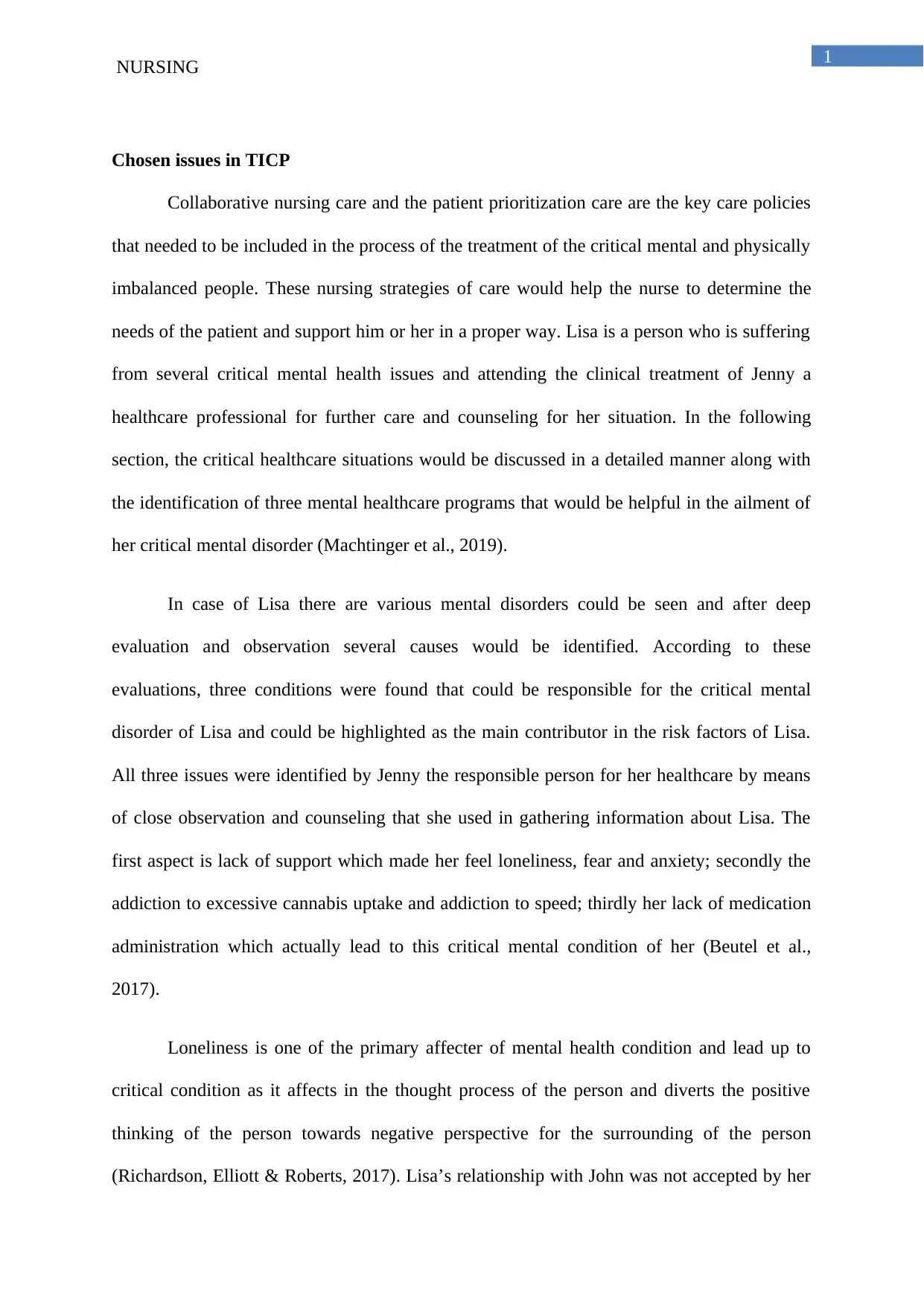
1
NURSING
Chosen issues in TICP
Collaborative nursing care and the patient prioritization care are the key care policies
that needed to be included in the process of the treatment of the critical mental and physically
imbalanced people. These nursing strategies of care would help the nurse to determine the
needs of the patient and support him or her in a proper way. Lisa is a person who is suffering
from several critical mental health issues and attending the clinical treatment of Jenny a
healthcare professional for further care and counseling for her situation. In the following
section, the critical healthcare situations would be discussed in a detailed manner along with
the identification of three mental healthcare programs that would be helpful in the ailment of
her critical mental disorder (Machtinger et al., 2019).
In case of Lisa there are various mental disorders could be seen and after deep
evaluation and observation several causes would be identified. According to these
evaluations, three conditions were found that could be responsible for the critical mental
disorder of Lisa and could be highlighted as the main contributor in the risk factors of Lisa.
All three issues were identified by Jenny the responsible person for her healthcare by means
of close observation and counseling that she used in gathering information about Lisa. The
first aspect is lack of support which made her feel loneliness, fear and anxiety; secondly the
addiction to excessive cannabis uptake and addiction to speed; thirdly her lack of medication
administration which actually lead to this critical mental condition of her (Beutel et al.,
2017).
Loneliness is one of the primary affecter of mental health condition and lead up to
critical condition as it affects in the thought process of the person and diverts the positive
thinking of the person towards negative perspective for the surrounding of the person
(Richardson, Elliott & Roberts, 2017). Lisa’s relationship with John was not accepted by her
NURSING
Chosen issues in TICP
Collaborative nursing care and the patient prioritization care are the key care policies
that needed to be included in the process of the treatment of the critical mental and physically
imbalanced people. These nursing strategies of care would help the nurse to determine the
needs of the patient and support him or her in a proper way. Lisa is a person who is suffering
from several critical mental health issues and attending the clinical treatment of Jenny a
healthcare professional for further care and counseling for her situation. In the following
section, the critical healthcare situations would be discussed in a detailed manner along with
the identification of three mental healthcare programs that would be helpful in the ailment of
her critical mental disorder (Machtinger et al., 2019).
In case of Lisa there are various mental disorders could be seen and after deep
evaluation and observation several causes would be identified. According to these
evaluations, three conditions were found that could be responsible for the critical mental
disorder of Lisa and could be highlighted as the main contributor in the risk factors of Lisa.
All three issues were identified by Jenny the responsible person for her healthcare by means
of close observation and counseling that she used in gathering information about Lisa. The
first aspect is lack of support which made her feel loneliness, fear and anxiety; secondly the
addiction to excessive cannabis uptake and addiction to speed; thirdly her lack of medication
administration which actually lead to this critical mental condition of her (Beutel et al.,
2017).
Loneliness is one of the primary affecter of mental health condition and lead up to
critical condition as it affects in the thought process of the person and diverts the positive
thinking of the person towards negative perspective for the surrounding of the person
(Richardson, Elliott & Roberts, 2017). Lisa’s relationship with John was not accepted by her
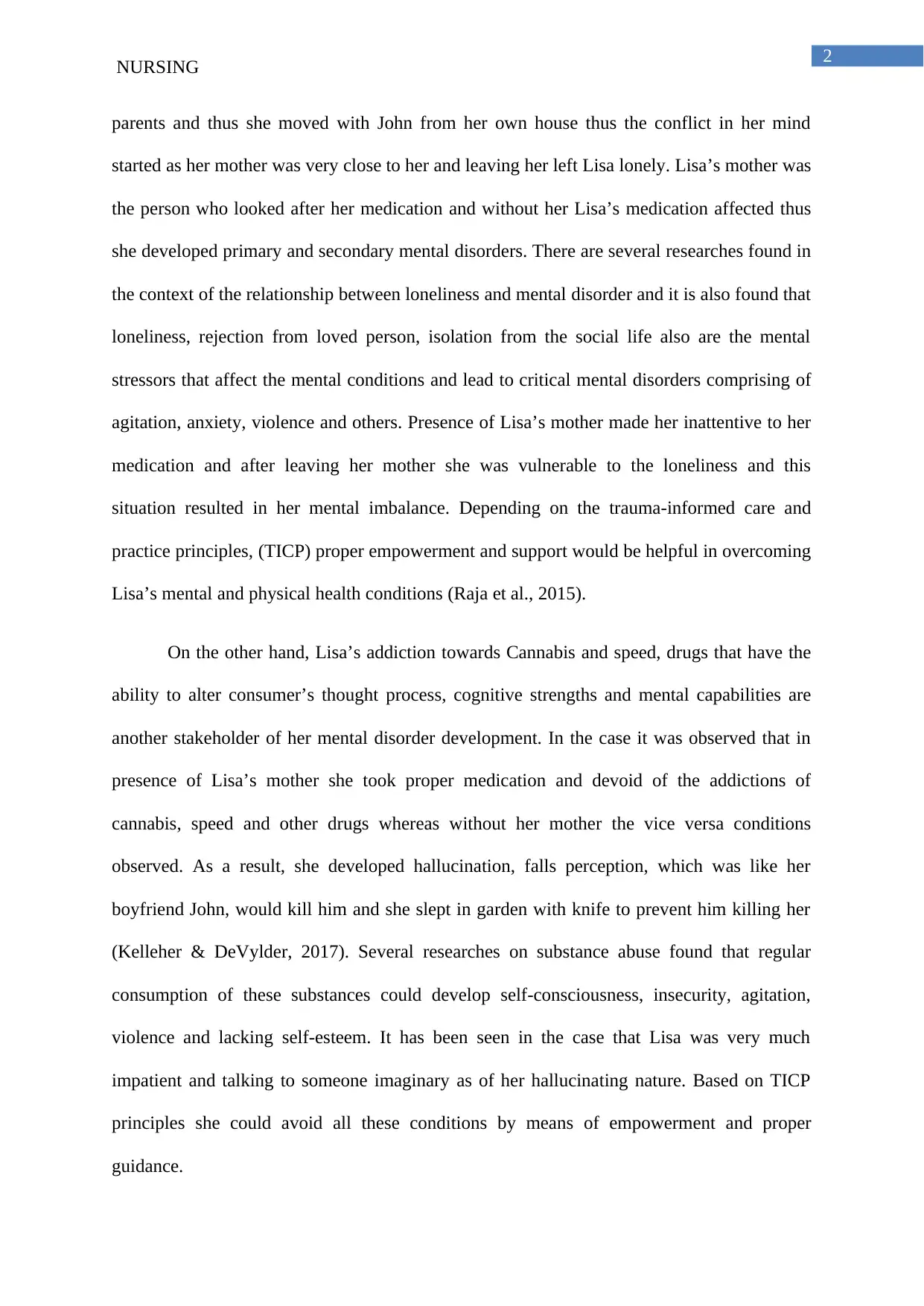
2
NURSING
parents and thus she moved with John from her own house thus the conflict in her mind
started as her mother was very close to her and leaving her left Lisa lonely. Lisa’s mother was
the person who looked after her medication and without her Lisa’s medication affected thus
she developed primary and secondary mental disorders. There are several researches found in
the context of the relationship between loneliness and mental disorder and it is also found that
loneliness, rejection from loved person, isolation from the social life also are the mental
stressors that affect the mental conditions and lead to critical mental disorders comprising of
agitation, anxiety, violence and others. Presence of Lisa’s mother made her inattentive to her
medication and after leaving her mother she was vulnerable to the loneliness and this
situation resulted in her mental imbalance. Depending on the trauma-informed care and
practice principles, (TICP) proper empowerment and support would be helpful in overcoming
Lisa’s mental and physical health conditions (Raja et al., 2015).
On the other hand, Lisa’s addiction towards Cannabis and speed, drugs that have the
ability to alter consumer’s thought process, cognitive strengths and mental capabilities are
another stakeholder of her mental disorder development. In the case it was observed that in
presence of Lisa’s mother she took proper medication and devoid of the addictions of
cannabis, speed and other drugs whereas without her mother the vice versa conditions
observed. As a result, she developed hallucination, falls perception, which was like her
boyfriend John, would kill him and she slept in garden with knife to prevent him killing her
(Kelleher & DeVylder, 2017). Several researches on substance abuse found that regular
consumption of these substances could develop self-consciousness, insecurity, agitation,
violence and lacking self-esteem. It has been seen in the case that Lisa was very much
impatient and talking to someone imaginary as of her hallucinating nature. Based on TICP
principles she could avoid all these conditions by means of empowerment and proper
guidance.
NURSING
parents and thus she moved with John from her own house thus the conflict in her mind
started as her mother was very close to her and leaving her left Lisa lonely. Lisa’s mother was
the person who looked after her medication and without her Lisa’s medication affected thus
she developed primary and secondary mental disorders. There are several researches found in
the context of the relationship between loneliness and mental disorder and it is also found that
loneliness, rejection from loved person, isolation from the social life also are the mental
stressors that affect the mental conditions and lead to critical mental disorders comprising of
agitation, anxiety, violence and others. Presence of Lisa’s mother made her inattentive to her
medication and after leaving her mother she was vulnerable to the loneliness and this
situation resulted in her mental imbalance. Depending on the trauma-informed care and
practice principles, (TICP) proper empowerment and support would be helpful in overcoming
Lisa’s mental and physical health conditions (Raja et al., 2015).
On the other hand, Lisa’s addiction towards Cannabis and speed, drugs that have the
ability to alter consumer’s thought process, cognitive strengths and mental capabilities are
another stakeholder of her mental disorder development. In the case it was observed that in
presence of Lisa’s mother she took proper medication and devoid of the addictions of
cannabis, speed and other drugs whereas without her mother the vice versa conditions
observed. As a result, she developed hallucination, falls perception, which was like her
boyfriend John, would kill him and she slept in garden with knife to prevent him killing her
(Kelleher & DeVylder, 2017). Several researches on substance abuse found that regular
consumption of these substances could develop self-consciousness, insecurity, agitation,
violence and lacking self-esteem. It has been seen in the case that Lisa was very much
impatient and talking to someone imaginary as of her hallucinating nature. Based on TICP
principles she could avoid all these conditions by means of empowerment and proper
guidance.
⊘ This is a preview!⊘
Do you want full access?
Subscribe today to unlock all pages.

Trusted by 1+ million students worldwide
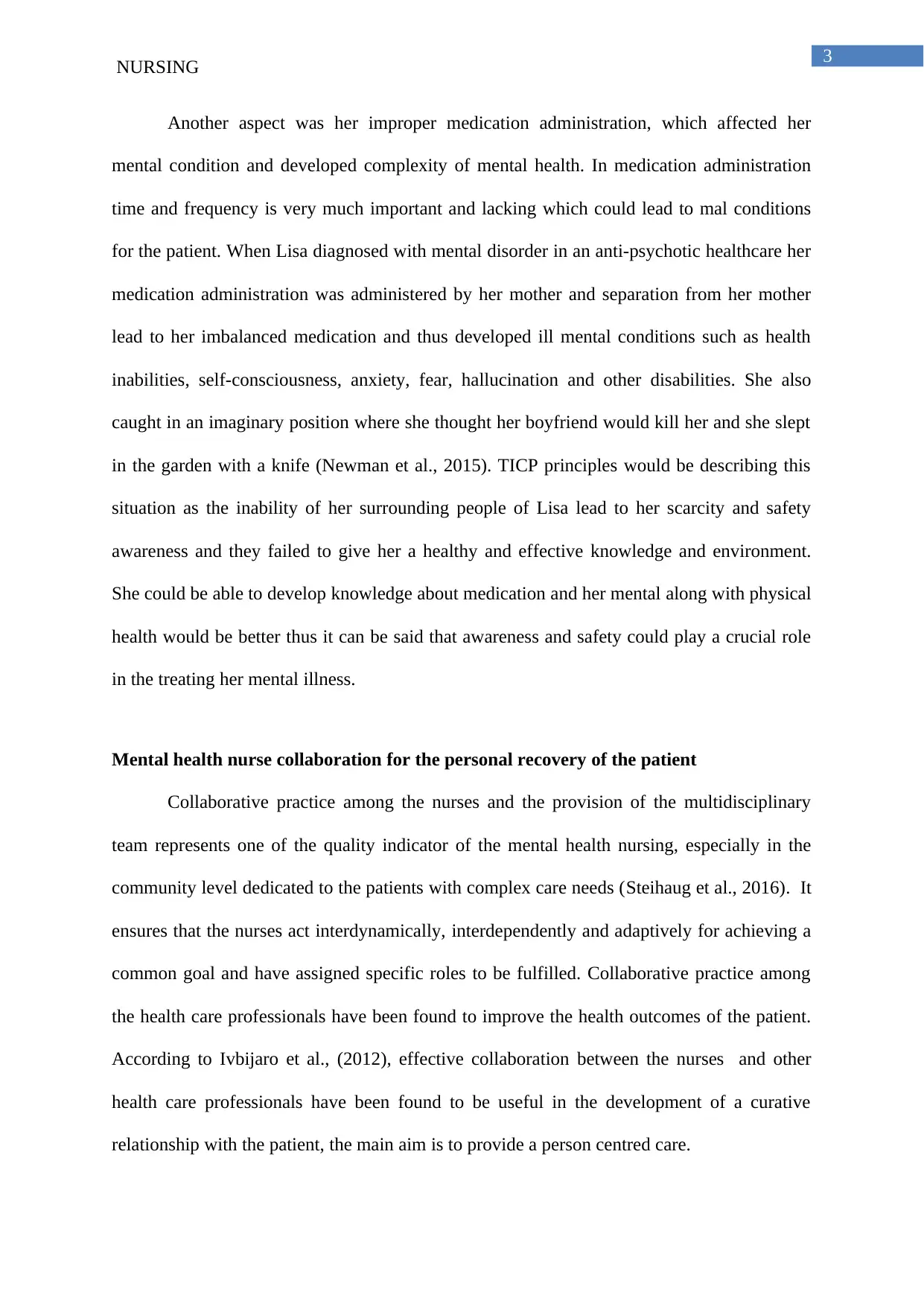
3
NURSING
Another aspect was her improper medication administration, which affected her
mental condition and developed complexity of mental health. In medication administration
time and frequency is very much important and lacking which could lead to mal conditions
for the patient. When Lisa diagnosed with mental disorder in an anti-psychotic healthcare her
medication administration was administered by her mother and separation from her mother
lead to her imbalanced medication and thus developed ill mental conditions such as health
inabilities, self-consciousness, anxiety, fear, hallucination and other disabilities. She also
caught in an imaginary position where she thought her boyfriend would kill her and she slept
in the garden with a knife (Newman et al., 2015). TICP principles would be describing this
situation as the inability of her surrounding people of Lisa lead to her scarcity and safety
awareness and they failed to give her a healthy and effective knowledge and environment.
She could be able to develop knowledge about medication and her mental along with physical
health would be better thus it can be said that awareness and safety could play a crucial role
in the treating her mental illness.
Mental health nurse collaboration for the personal recovery of the patient
Collaborative practice among the nurses and the provision of the multidisciplinary
team represents one of the quality indicator of the mental health nursing, especially in the
community level dedicated to the patients with complex care needs (Steihaug et al., 2016). It
ensures that the nurses act interdynamically, interdependently and adaptively for achieving a
common goal and have assigned specific roles to be fulfilled. Collaborative practice among
the health care professionals have been found to improve the health outcomes of the patient.
According to Ivbijaro et al., (2012), effective collaboration between the nurses and other
health care professionals have been found to be useful in the development of a curative
relationship with the patient, the main aim is to provide a person centred care.
NURSING
Another aspect was her improper medication administration, which affected her
mental condition and developed complexity of mental health. In medication administration
time and frequency is very much important and lacking which could lead to mal conditions
for the patient. When Lisa diagnosed with mental disorder in an anti-psychotic healthcare her
medication administration was administered by her mother and separation from her mother
lead to her imbalanced medication and thus developed ill mental conditions such as health
inabilities, self-consciousness, anxiety, fear, hallucination and other disabilities. She also
caught in an imaginary position where she thought her boyfriend would kill her and she slept
in the garden with a knife (Newman et al., 2015). TICP principles would be describing this
situation as the inability of her surrounding people of Lisa lead to her scarcity and safety
awareness and they failed to give her a healthy and effective knowledge and environment.
She could be able to develop knowledge about medication and her mental along with physical
health would be better thus it can be said that awareness and safety could play a crucial role
in the treating her mental illness.
Mental health nurse collaboration for the personal recovery of the patient
Collaborative practice among the nurses and the provision of the multidisciplinary
team represents one of the quality indicator of the mental health nursing, especially in the
community level dedicated to the patients with complex care needs (Steihaug et al., 2016). It
ensures that the nurses act interdynamically, interdependently and adaptively for achieving a
common goal and have assigned specific roles to be fulfilled. Collaborative practice among
the health care professionals have been found to improve the health outcomes of the patient.
According to Ivbijaro et al., (2012), effective collaboration between the nurses and other
health care professionals have been found to be useful in the development of a curative
relationship with the patient, the main aim is to provide a person centred care.
Paraphrase This Document
Need a fresh take? Get an instant paraphrase of this document with our AI Paraphraser
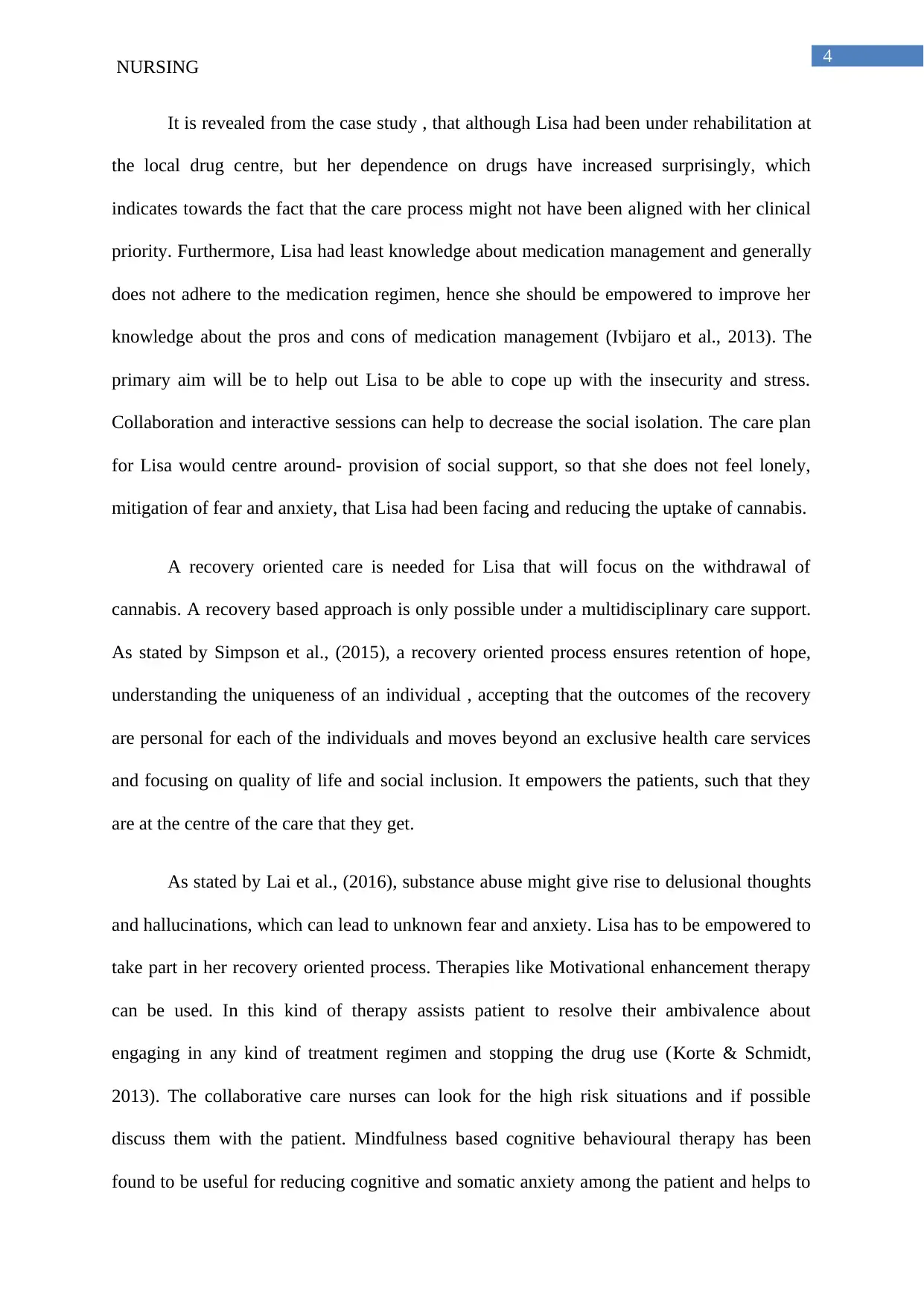
4
NURSING
It is revealed from the case study , that although Lisa had been under rehabilitation at
the local drug centre, but her dependence on drugs have increased surprisingly, which
indicates towards the fact that the care process might not have been aligned with her clinical
priority. Furthermore, Lisa had least knowledge about medication management and generally
does not adhere to the medication regimen, hence she should be empowered to improve her
knowledge about the pros and cons of medication management (Ivbijaro et al., 2013). The
primary aim will be to help out Lisa to be able to cope up with the insecurity and stress.
Collaboration and interactive sessions can help to decrease the social isolation. The care plan
for Lisa would centre around- provision of social support, so that she does not feel lonely,
mitigation of fear and anxiety, that Lisa had been facing and reducing the uptake of cannabis.
A recovery oriented care is needed for Lisa that will focus on the withdrawal of
cannabis. A recovery based approach is only possible under a multidisciplinary care support.
As stated by Simpson et al., (2015), a recovery oriented process ensures retention of hope,
understanding the uniqueness of an individual , accepting that the outcomes of the recovery
are personal for each of the individuals and moves beyond an exclusive health care services
and focusing on quality of life and social inclusion. It empowers the patients, such that they
are at the centre of the care that they get.
As stated by Lai et al., (2016), substance abuse might give rise to delusional thoughts
and hallucinations, which can lead to unknown fear and anxiety. Lisa has to be empowered to
take part in her recovery oriented process. Therapies like Motivational enhancement therapy
can be used. In this kind of therapy assists patient to resolve their ambivalence about
engaging in any kind of treatment regimen and stopping the drug use (Korte & Schmidt,
2013). The collaborative care nurses can look for the high risk situations and if possible
discuss them with the patient. Mindfulness based cognitive behavioural therapy has been
found to be useful for reducing cognitive and somatic anxiety among the patient and helps to
NURSING
It is revealed from the case study , that although Lisa had been under rehabilitation at
the local drug centre, but her dependence on drugs have increased surprisingly, which
indicates towards the fact that the care process might not have been aligned with her clinical
priority. Furthermore, Lisa had least knowledge about medication management and generally
does not adhere to the medication regimen, hence she should be empowered to improve her
knowledge about the pros and cons of medication management (Ivbijaro et al., 2013). The
primary aim will be to help out Lisa to be able to cope up with the insecurity and stress.
Collaboration and interactive sessions can help to decrease the social isolation. The care plan
for Lisa would centre around- provision of social support, so that she does not feel lonely,
mitigation of fear and anxiety, that Lisa had been facing and reducing the uptake of cannabis.
A recovery oriented care is needed for Lisa that will focus on the withdrawal of
cannabis. A recovery based approach is only possible under a multidisciplinary care support.
As stated by Simpson et al., (2015), a recovery oriented process ensures retention of hope,
understanding the uniqueness of an individual , accepting that the outcomes of the recovery
are personal for each of the individuals and moves beyond an exclusive health care services
and focusing on quality of life and social inclusion. It empowers the patients, such that they
are at the centre of the care that they get.
As stated by Lai et al., (2016), substance abuse might give rise to delusional thoughts
and hallucinations, which can lead to unknown fear and anxiety. Lisa has to be empowered to
take part in her recovery oriented process. Therapies like Motivational enhancement therapy
can be used. In this kind of therapy assists patient to resolve their ambivalence about
engaging in any kind of treatment regimen and stopping the drug use (Korte & Schmidt,
2013). The collaborative care nurses can look for the high risk situations and if possible
discuss them with the patient. Mindfulness based cognitive behavioural therapy has been
found to be useful for reducing cognitive and somatic anxiety among the patient and helps to
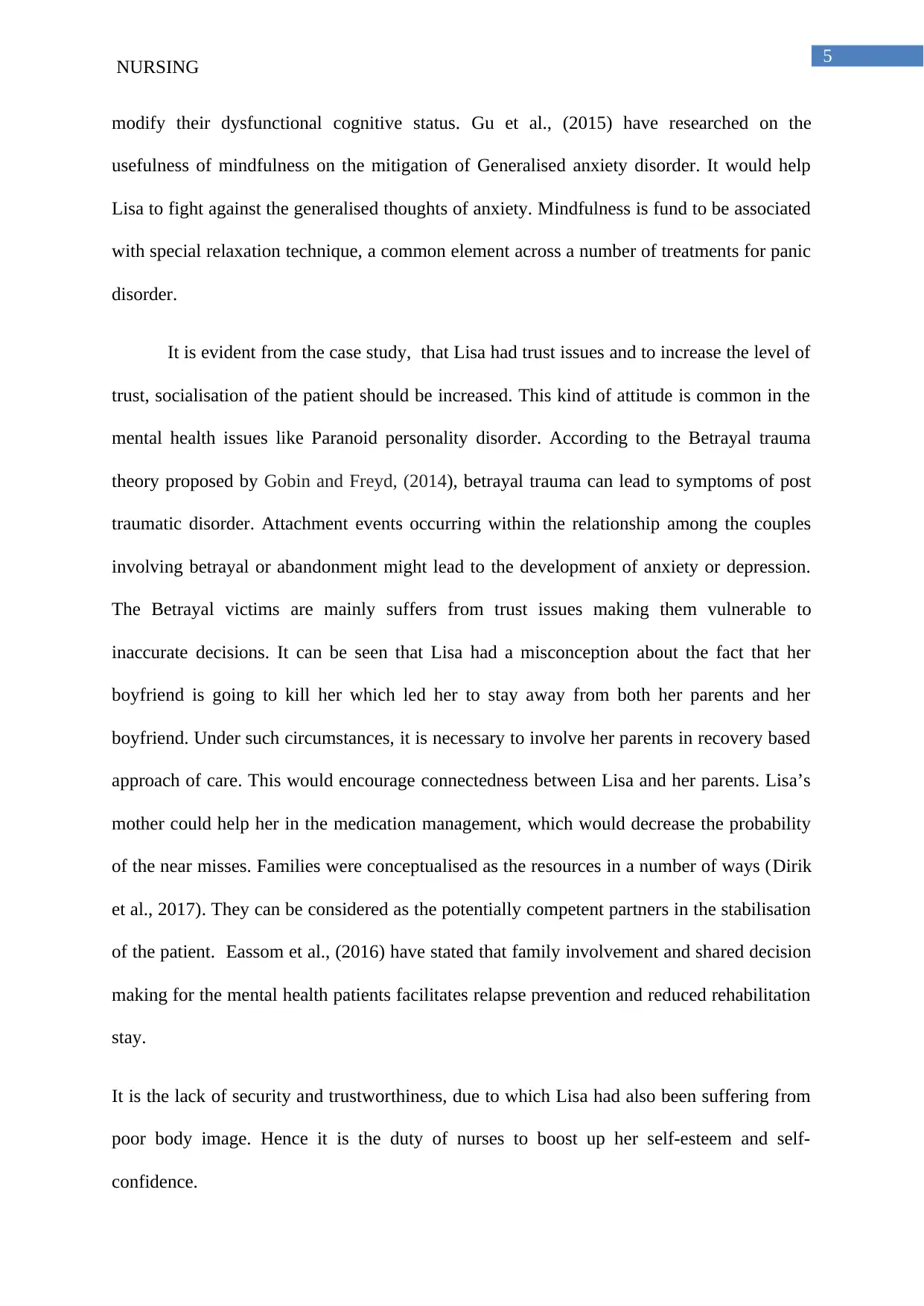
5
NURSING
modify their dysfunctional cognitive status. Gu et al., (2015) have researched on the
usefulness of mindfulness on the mitigation of Generalised anxiety disorder. It would help
Lisa to fight against the generalised thoughts of anxiety. Mindfulness is fund to be associated
with special relaxation technique, a common element across a number of treatments for panic
disorder.
It is evident from the case study, that Lisa had trust issues and to increase the level of
trust, socialisation of the patient should be increased. This kind of attitude is common in the
mental health issues like Paranoid personality disorder. According to the Betrayal trauma
theory proposed by Gobin and Freyd, (2014), betrayal trauma can lead to symptoms of post
traumatic disorder. Attachment events occurring within the relationship among the couples
involving betrayal or abandonment might lead to the development of anxiety or depression.
The Betrayal victims are mainly suffers from trust issues making them vulnerable to
inaccurate decisions. It can be seen that Lisa had a misconception about the fact that her
boyfriend is going to kill her which led her to stay away from both her parents and her
boyfriend. Under such circumstances, it is necessary to involve her parents in recovery based
approach of care. This would encourage connectedness between Lisa and her parents. Lisa’s
mother could help her in the medication management, which would decrease the probability
of the near misses. Families were conceptualised as the resources in a number of ways (Dirik
et al., 2017). They can be considered as the potentially competent partners in the stabilisation
of the patient. Eassom et al., (2016) have stated that family involvement and shared decision
making for the mental health patients facilitates relapse prevention and reduced rehabilitation
stay.
It is the lack of security and trustworthiness, due to which Lisa had also been suffering from
poor body image. Hence it is the duty of nurses to boost up her self-esteem and self-
confidence.
NURSING
modify their dysfunctional cognitive status. Gu et al., (2015) have researched on the
usefulness of mindfulness on the mitigation of Generalised anxiety disorder. It would help
Lisa to fight against the generalised thoughts of anxiety. Mindfulness is fund to be associated
with special relaxation technique, a common element across a number of treatments for panic
disorder.
It is evident from the case study, that Lisa had trust issues and to increase the level of
trust, socialisation of the patient should be increased. This kind of attitude is common in the
mental health issues like Paranoid personality disorder. According to the Betrayal trauma
theory proposed by Gobin and Freyd, (2014), betrayal trauma can lead to symptoms of post
traumatic disorder. Attachment events occurring within the relationship among the couples
involving betrayal or abandonment might lead to the development of anxiety or depression.
The Betrayal victims are mainly suffers from trust issues making them vulnerable to
inaccurate decisions. It can be seen that Lisa had a misconception about the fact that her
boyfriend is going to kill her which led her to stay away from both her parents and her
boyfriend. Under such circumstances, it is necessary to involve her parents in recovery based
approach of care. This would encourage connectedness between Lisa and her parents. Lisa’s
mother could help her in the medication management, which would decrease the probability
of the near misses. Families were conceptualised as the resources in a number of ways (Dirik
et al., 2017). They can be considered as the potentially competent partners in the stabilisation
of the patient. Eassom et al., (2016) have stated that family involvement and shared decision
making for the mental health patients facilitates relapse prevention and reduced rehabilitation
stay.
It is the lack of security and trustworthiness, due to which Lisa had also been suffering from
poor body image. Hence it is the duty of nurses to boost up her self-esteem and self-
confidence.
⊘ This is a preview!⊘
Do you want full access?
Subscribe today to unlock all pages.

Trusted by 1+ million students worldwide
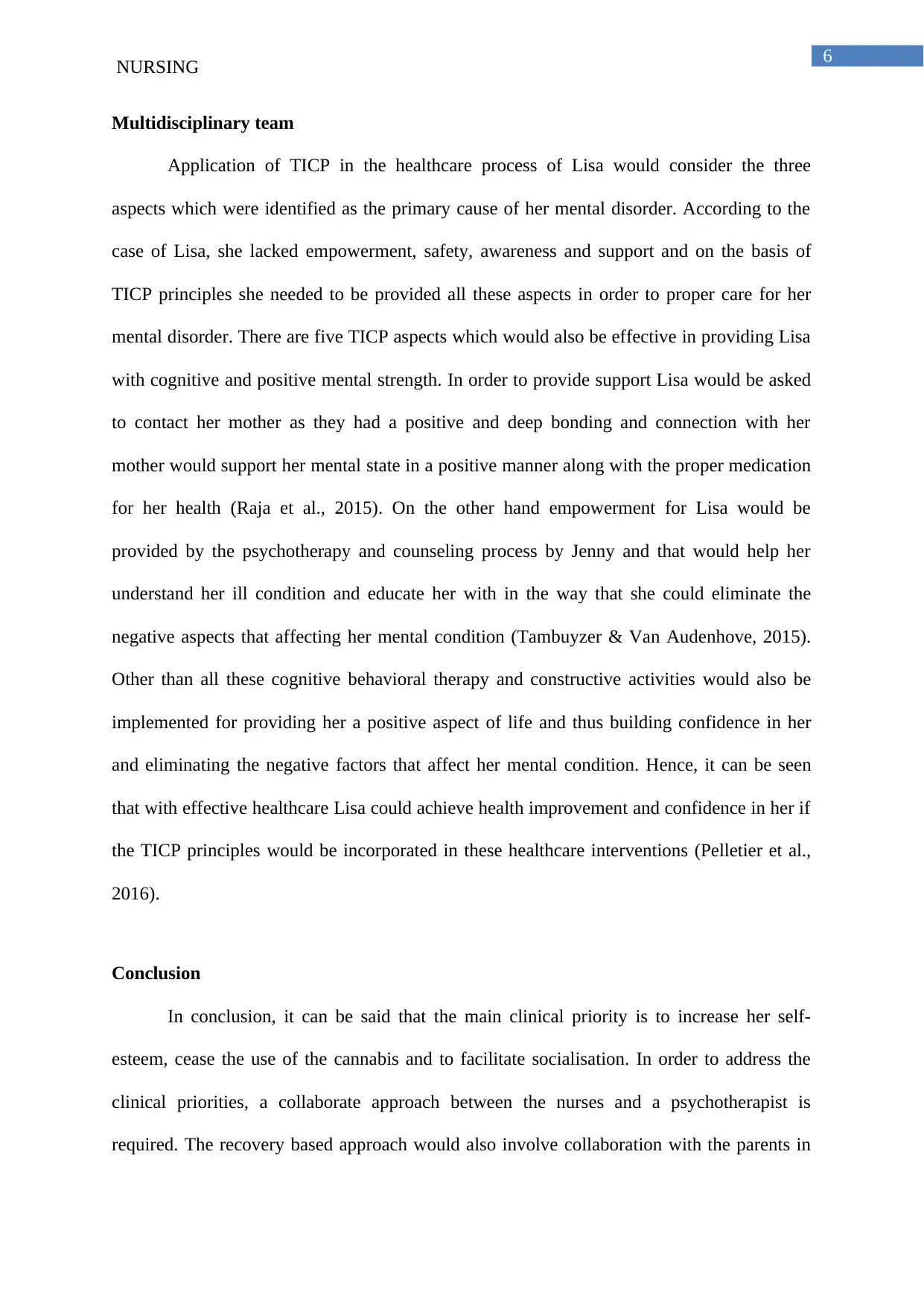
6
NURSING
Multidisciplinary team
Application of TICP in the healthcare process of Lisa would consider the three
aspects which were identified as the primary cause of her mental disorder. According to the
case of Lisa, she lacked empowerment, safety, awareness and support and on the basis of
TICP principles she needed to be provided all these aspects in order to proper care for her
mental disorder. There are five TICP aspects which would also be effective in providing Lisa
with cognitive and positive mental strength. In order to provide support Lisa would be asked
to contact her mother as they had a positive and deep bonding and connection with her
mother would support her mental state in a positive manner along with the proper medication
for her health (Raja et al., 2015). On the other hand empowerment for Lisa would be
provided by the psychotherapy and counseling process by Jenny and that would help her
understand her ill condition and educate her with in the way that she could eliminate the
negative aspects that affecting her mental condition (Tambuyzer & Van Audenhove, 2015).
Other than all these cognitive behavioral therapy and constructive activities would also be
implemented for providing her a positive aspect of life and thus building confidence in her
and eliminating the negative factors that affect her mental condition. Hence, it can be seen
that with effective healthcare Lisa could achieve health improvement and confidence in her if
the TICP principles would be incorporated in these healthcare interventions (Pelletier et al.,
2016).
Conclusion
In conclusion, it can be said that the main clinical priority is to increase her self-
esteem, cease the use of the cannabis and to facilitate socialisation. In order to address the
clinical priorities, a collaborate approach between the nurses and a psychotherapist is
required. The recovery based approach would also involve collaboration with the parents in
NURSING
Multidisciplinary team
Application of TICP in the healthcare process of Lisa would consider the three
aspects which were identified as the primary cause of her mental disorder. According to the
case of Lisa, she lacked empowerment, safety, awareness and support and on the basis of
TICP principles she needed to be provided all these aspects in order to proper care for her
mental disorder. There are five TICP aspects which would also be effective in providing Lisa
with cognitive and positive mental strength. In order to provide support Lisa would be asked
to contact her mother as they had a positive and deep bonding and connection with her
mother would support her mental state in a positive manner along with the proper medication
for her health (Raja et al., 2015). On the other hand empowerment for Lisa would be
provided by the psychotherapy and counseling process by Jenny and that would help her
understand her ill condition and educate her with in the way that she could eliminate the
negative aspects that affecting her mental condition (Tambuyzer & Van Audenhove, 2015).
Other than all these cognitive behavioral therapy and constructive activities would also be
implemented for providing her a positive aspect of life and thus building confidence in her
and eliminating the negative factors that affect her mental condition. Hence, it can be seen
that with effective healthcare Lisa could achieve health improvement and confidence in her if
the TICP principles would be incorporated in these healthcare interventions (Pelletier et al.,
2016).
Conclusion
In conclusion, it can be said that the main clinical priority is to increase her self-
esteem, cease the use of the cannabis and to facilitate socialisation. In order to address the
clinical priorities, a collaborate approach between the nurses and a psychotherapist is
required. The recovery based approach would also involve collaboration with the parents in
Paraphrase This Document
Need a fresh take? Get an instant paraphrase of this document with our AI Paraphraser

7
NURSING
the development of the care planning. Mindfulness based therapy, Motivational enhancement
therapy can be useful treating Lisa.
NURSING
the development of the care planning. Mindfulness based therapy, Motivational enhancement
therapy can be useful treating Lisa.
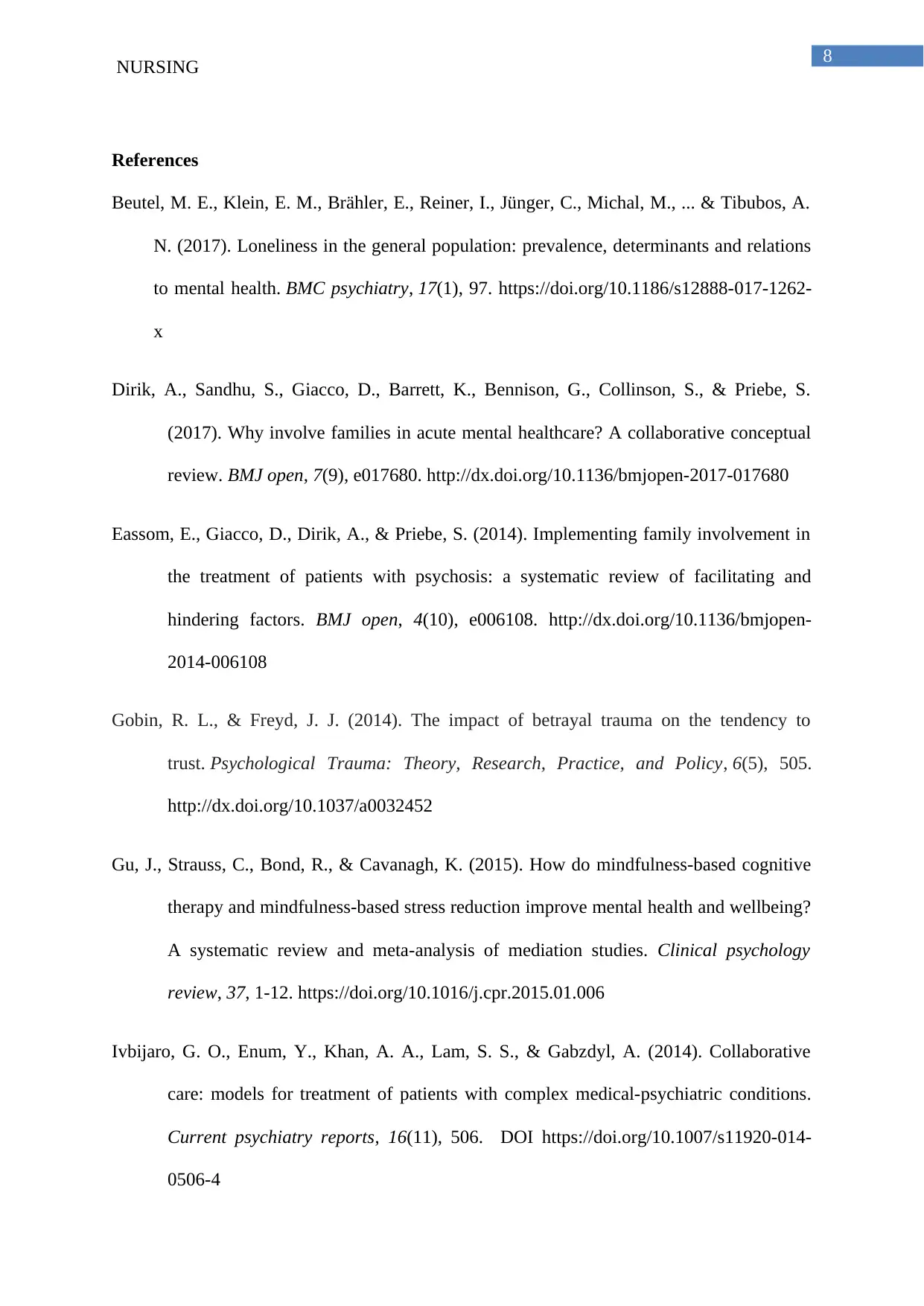
8
NURSING
References
Beutel, M. E., Klein, E. M., Brähler, E., Reiner, I., Jünger, C., Michal, M., ... & Tibubos, A.
N. (2017). Loneliness in the general population: prevalence, determinants and relations
to mental health. BMC psychiatry, 17(1), 97. https://doi.org/10.1186/s12888-017-1262-
x
Dirik, A., Sandhu, S., Giacco, D., Barrett, K., Bennison, G., Collinson, S., & Priebe, S.
(2017). Why involve families in acute mental healthcare? A collaborative conceptual
review. BMJ open, 7(9), e017680. http://dx.doi.org/10.1136/bmjopen-2017-017680
Eassom, E., Giacco, D., Dirik, A., & Priebe, S. (2014). Implementing family involvement in
the treatment of patients with psychosis: a systematic review of facilitating and
hindering factors. BMJ open, 4(10), e006108. http://dx.doi.org/10.1136/bmjopen-
2014-006108
Gobin, R. L., & Freyd, J. J. (2014). The impact of betrayal trauma on the tendency to
trust. Psychological Trauma: Theory, Research, Practice, and Policy, 6(5), 505.
http://dx.doi.org/10.1037/a0032452
Gu, J., Strauss, C., Bond, R., & Cavanagh, K. (2015). How do mindfulness-based cognitive
therapy and mindfulness-based stress reduction improve mental health and wellbeing?
A systematic review and meta-analysis of mediation studies. Clinical psychology
review, 37, 1-12. https://doi.org/10.1016/j.cpr.2015.01.006
Ivbijaro, G. O., Enum, Y., Khan, A. A., Lam, S. S., & Gabzdyl, A. (2014). Collaborative
care: models for treatment of patients with complex medical-psychiatric conditions.
Current psychiatry reports, 16(11), 506. DOI https://doi.org/10.1007/s11920-014-
0506-4
NURSING
References
Beutel, M. E., Klein, E. M., Brähler, E., Reiner, I., Jünger, C., Michal, M., ... & Tibubos, A.
N. (2017). Loneliness in the general population: prevalence, determinants and relations
to mental health. BMC psychiatry, 17(1), 97. https://doi.org/10.1186/s12888-017-1262-
x
Dirik, A., Sandhu, S., Giacco, D., Barrett, K., Bennison, G., Collinson, S., & Priebe, S.
(2017). Why involve families in acute mental healthcare? A collaborative conceptual
review. BMJ open, 7(9), e017680. http://dx.doi.org/10.1136/bmjopen-2017-017680
Eassom, E., Giacco, D., Dirik, A., & Priebe, S. (2014). Implementing family involvement in
the treatment of patients with psychosis: a systematic review of facilitating and
hindering factors. BMJ open, 4(10), e006108. http://dx.doi.org/10.1136/bmjopen-
2014-006108
Gobin, R. L., & Freyd, J. J. (2014). The impact of betrayal trauma on the tendency to
trust. Psychological Trauma: Theory, Research, Practice, and Policy, 6(5), 505.
http://dx.doi.org/10.1037/a0032452
Gu, J., Strauss, C., Bond, R., & Cavanagh, K. (2015). How do mindfulness-based cognitive
therapy and mindfulness-based stress reduction improve mental health and wellbeing?
A systematic review and meta-analysis of mediation studies. Clinical psychology
review, 37, 1-12. https://doi.org/10.1016/j.cpr.2015.01.006
Ivbijaro, G. O., Enum, Y., Khan, A. A., Lam, S. S., & Gabzdyl, A. (2014). Collaborative
care: models for treatment of patients with complex medical-psychiatric conditions.
Current psychiatry reports, 16(11), 506. DOI https://doi.org/10.1007/s11920-014-
0506-4
⊘ This is a preview!⊘
Do you want full access?
Subscribe today to unlock all pages.

Trusted by 1+ million students worldwide
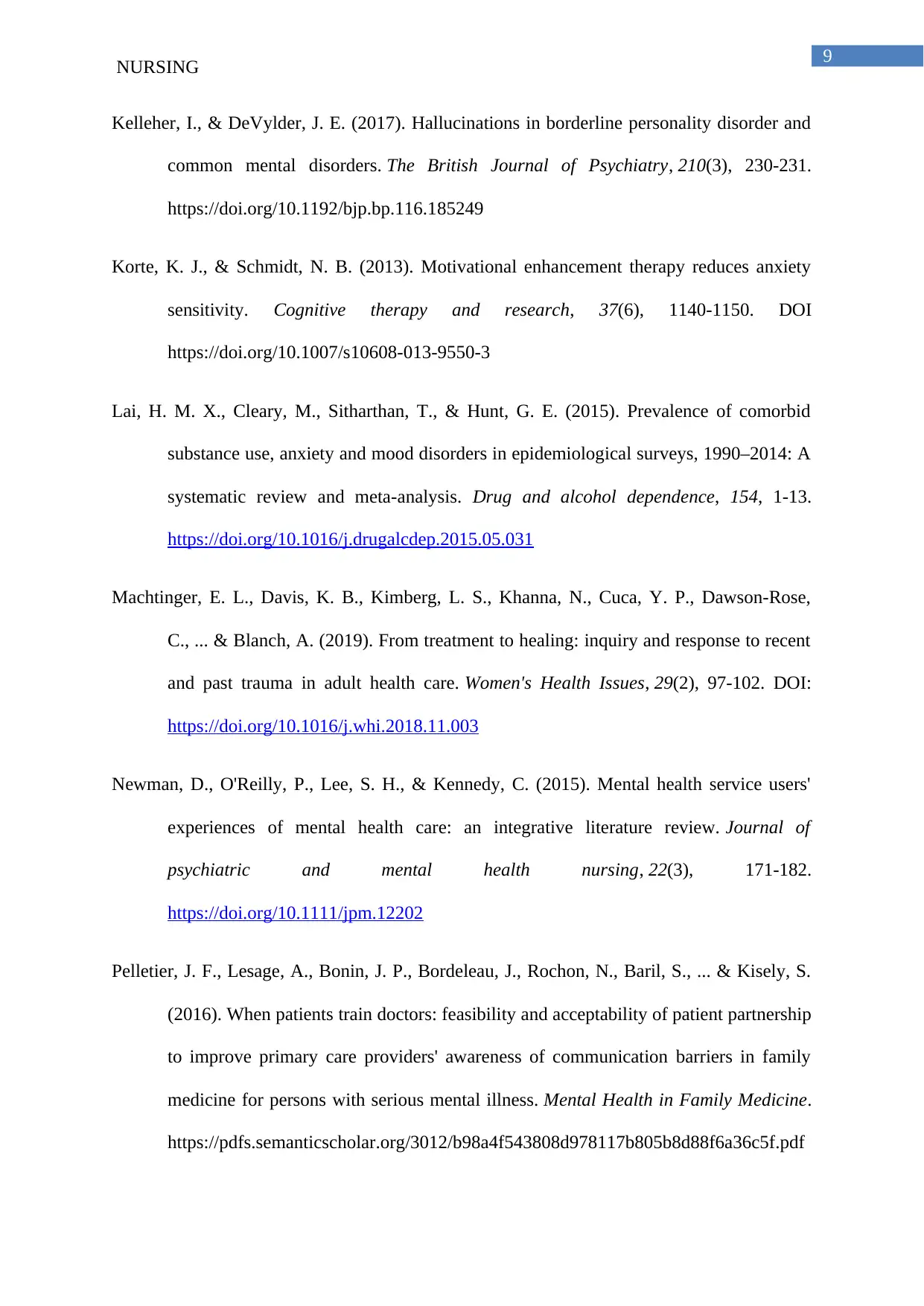
9
NURSING
Kelleher, I., & DeVylder, J. E. (2017). Hallucinations in borderline personality disorder and
common mental disorders. The British Journal of Psychiatry, 210(3), 230-231.
https://doi.org/10.1192/bjp.bp.116.185249
Korte, K. J., & Schmidt, N. B. (2013). Motivational enhancement therapy reduces anxiety
sensitivity. Cognitive therapy and research, 37(6), 1140-1150. DOI
https://doi.org/10.1007/s10608-013-9550-3
Lai, H. M. X., Cleary, M., Sitharthan, T., & Hunt, G. E. (2015). Prevalence of comorbid
substance use, anxiety and mood disorders in epidemiological surveys, 1990–2014: A
systematic review and meta-analysis. Drug and alcohol dependence, 154, 1-13.
https://doi.org/10.1016/j.drugalcdep.2015.05.031
Machtinger, E. L., Davis, K. B., Kimberg, L. S., Khanna, N., Cuca, Y. P., Dawson-Rose,
C., ... & Blanch, A. (2019). From treatment to healing: inquiry and response to recent
and past trauma in adult health care. Women's Health Issues, 29(2), 97-102. DOI:
https://doi.org/10.1016/j.whi.2018.11.003
Newman, D., O'Reilly, P., Lee, S. H., & Kennedy, C. (2015). Mental health service users'
experiences of mental health care: an integrative literature review. Journal of
psychiatric and mental health nursing, 22(3), 171-182.
https://doi.org/10.1111/jpm.12202
Pelletier, J. F., Lesage, A., Bonin, J. P., Bordeleau, J., Rochon, N., Baril, S., ... & Kisely, S.
(2016). When patients train doctors: feasibility and acceptability of patient partnership
to improve primary care providers' awareness of communication barriers in family
medicine for persons with serious mental illness. Mental Health in Family Medicine.
https://pdfs.semanticscholar.org/3012/b98a4f543808d978117b805b8d88f6a36c5f.pdf
NURSING
Kelleher, I., & DeVylder, J. E. (2017). Hallucinations in borderline personality disorder and
common mental disorders. The British Journal of Psychiatry, 210(3), 230-231.
https://doi.org/10.1192/bjp.bp.116.185249
Korte, K. J., & Schmidt, N. B. (2013). Motivational enhancement therapy reduces anxiety
sensitivity. Cognitive therapy and research, 37(6), 1140-1150. DOI
https://doi.org/10.1007/s10608-013-9550-3
Lai, H. M. X., Cleary, M., Sitharthan, T., & Hunt, G. E. (2015). Prevalence of comorbid
substance use, anxiety and mood disorders in epidemiological surveys, 1990–2014: A
systematic review and meta-analysis. Drug and alcohol dependence, 154, 1-13.
https://doi.org/10.1016/j.drugalcdep.2015.05.031
Machtinger, E. L., Davis, K. B., Kimberg, L. S., Khanna, N., Cuca, Y. P., Dawson-Rose,
C., ... & Blanch, A. (2019). From treatment to healing: inquiry and response to recent
and past trauma in adult health care. Women's Health Issues, 29(2), 97-102. DOI:
https://doi.org/10.1016/j.whi.2018.11.003
Newman, D., O'Reilly, P., Lee, S. H., & Kennedy, C. (2015). Mental health service users'
experiences of mental health care: an integrative literature review. Journal of
psychiatric and mental health nursing, 22(3), 171-182.
https://doi.org/10.1111/jpm.12202
Pelletier, J. F., Lesage, A., Bonin, J. P., Bordeleau, J., Rochon, N., Baril, S., ... & Kisely, S.
(2016). When patients train doctors: feasibility and acceptability of patient partnership
to improve primary care providers' awareness of communication barriers in family
medicine for persons with serious mental illness. Mental Health in Family Medicine.
https://pdfs.semanticscholar.org/3012/b98a4f543808d978117b805b8d88f6a36c5f.pdf
Paraphrase This Document
Need a fresh take? Get an instant paraphrase of this document with our AI Paraphraser
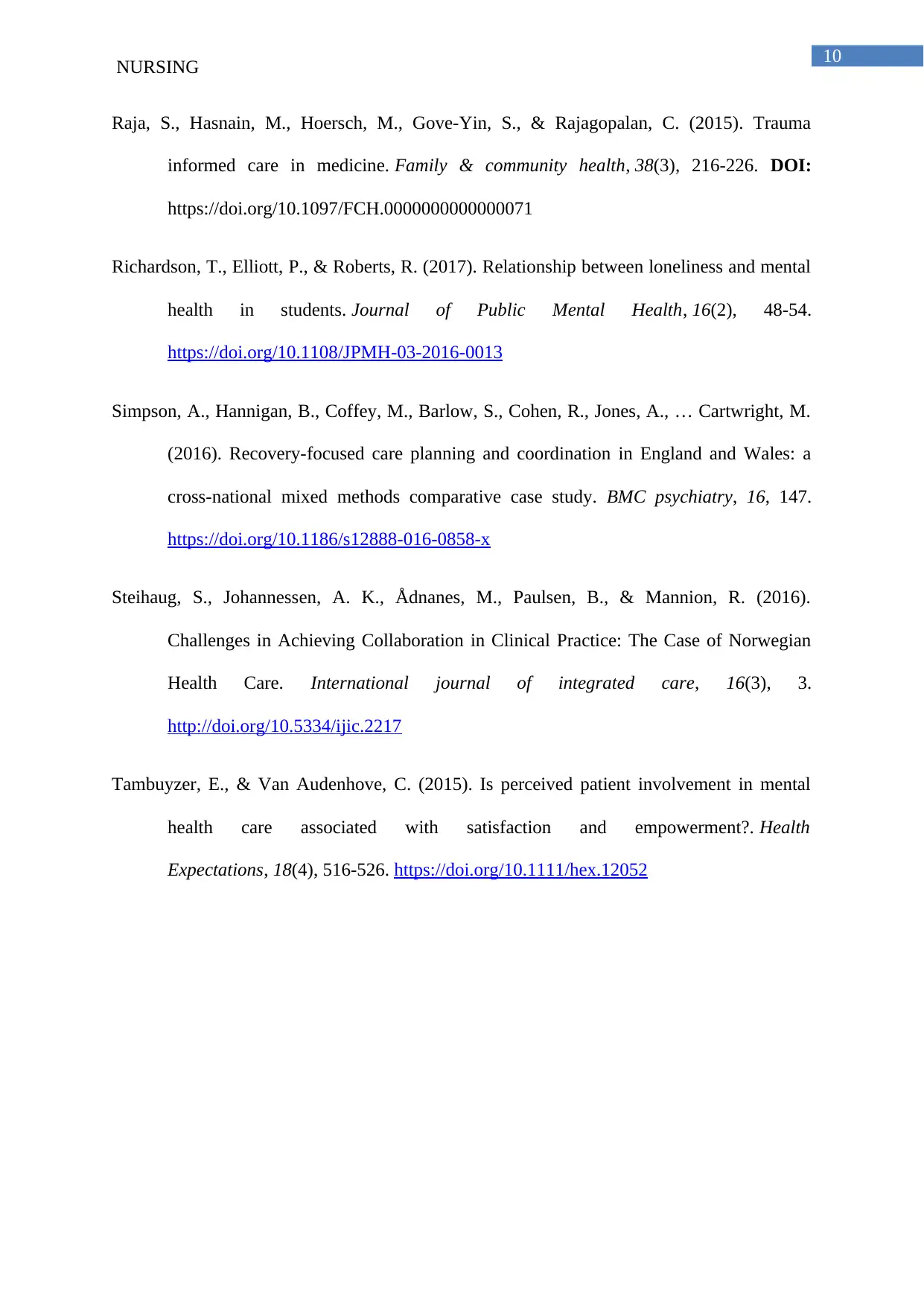
10
NURSING
Raja, S., Hasnain, M., Hoersch, M., Gove-Yin, S., & Rajagopalan, C. (2015). Trauma
informed care in medicine. Family & community health, 38(3), 216-226. DOI:
https://doi.org/10.1097/FCH.0000000000000071
Richardson, T., Elliott, P., & Roberts, R. (2017). Relationship between loneliness and mental
health in students. Journal of Public Mental Health, 16(2), 48-54.
https://doi.org/10.1108/JPMH-03-2016-0013
Simpson, A., Hannigan, B., Coffey, M., Barlow, S., Cohen, R., Jones, A., … Cartwright, M.
(2016). Recovery-focused care planning and coordination in England and Wales: a
cross-national mixed methods comparative case study. BMC psychiatry, 16, 147.
https://doi.org/10.1186/s12888-016-0858-x
Steihaug, S., Johannessen, A. K., Ådnanes, M., Paulsen, B., & Mannion, R. (2016).
Challenges in Achieving Collaboration in Clinical Practice: The Case of Norwegian
Health Care. International journal of integrated care, 16(3), 3.
http://doi.org/10.5334/ijic.2217
Tambuyzer, E., & Van Audenhove, C. (2015). Is perceived patient involvement in mental
health care associated with satisfaction and empowerment?. Health
Expectations, 18(4), 516-526. https://doi.org/10.1111/hex.12052
NURSING
Raja, S., Hasnain, M., Hoersch, M., Gove-Yin, S., & Rajagopalan, C. (2015). Trauma
informed care in medicine. Family & community health, 38(3), 216-226. DOI:
https://doi.org/10.1097/FCH.0000000000000071
Richardson, T., Elliott, P., & Roberts, R. (2017). Relationship between loneliness and mental
health in students. Journal of Public Mental Health, 16(2), 48-54.
https://doi.org/10.1108/JPMH-03-2016-0013
Simpson, A., Hannigan, B., Coffey, M., Barlow, S., Cohen, R., Jones, A., … Cartwright, M.
(2016). Recovery-focused care planning and coordination in England and Wales: a
cross-national mixed methods comparative case study. BMC psychiatry, 16, 147.
https://doi.org/10.1186/s12888-016-0858-x
Steihaug, S., Johannessen, A. K., Ådnanes, M., Paulsen, B., & Mannion, R. (2016).
Challenges in Achieving Collaboration in Clinical Practice: The Case of Norwegian
Health Care. International journal of integrated care, 16(3), 3.
http://doi.org/10.5334/ijic.2217
Tambuyzer, E., & Van Audenhove, C. (2015). Is perceived patient involvement in mental
health care associated with satisfaction and empowerment?. Health
Expectations, 18(4), 516-526. https://doi.org/10.1111/hex.12052
1 out of 11
Related Documents
Your All-in-One AI-Powered Toolkit for Academic Success.
+13062052269
info@desklib.com
Available 24*7 on WhatsApp / Email
![[object Object]](/_next/static/media/star-bottom.7253800d.svg)
Unlock your academic potential
Copyright © 2020–2026 A2Z Services. All Rights Reserved. Developed and managed by ZUCOL.
![Mental Health Nursing Assignment: Lisa Case Study, [University Name]](/_next/image/?url=https%3A%2F%2Fdesklib.com%2Fmedia%2Fimages%2Fpe%2F5e790301b8374363b0168e51e06aa3a5.jpg&w=256&q=75)




